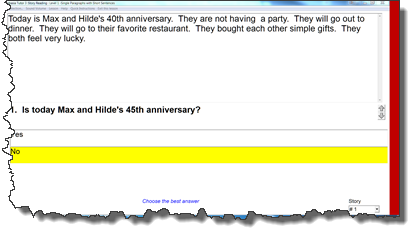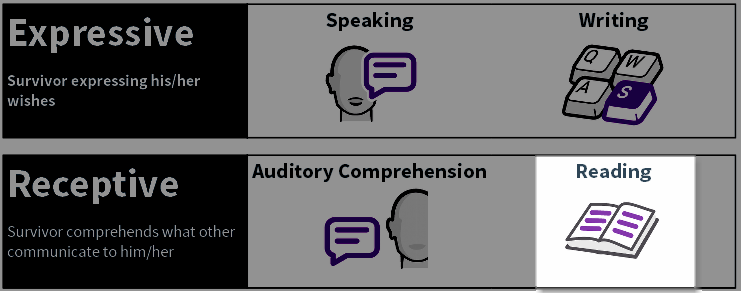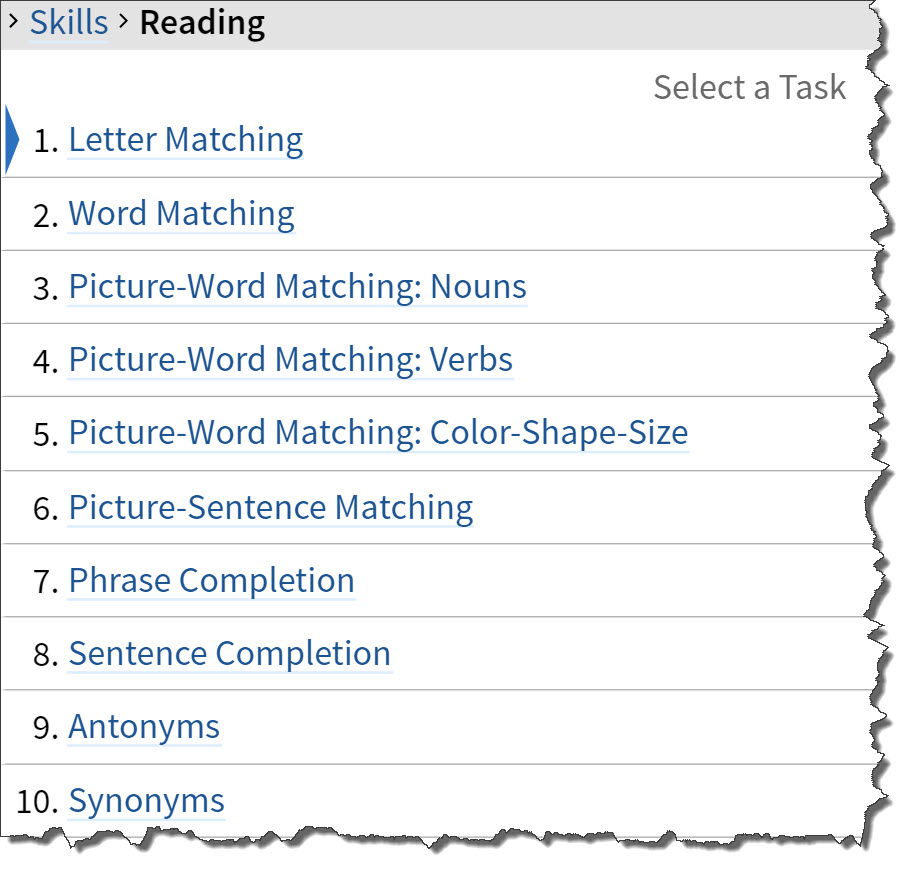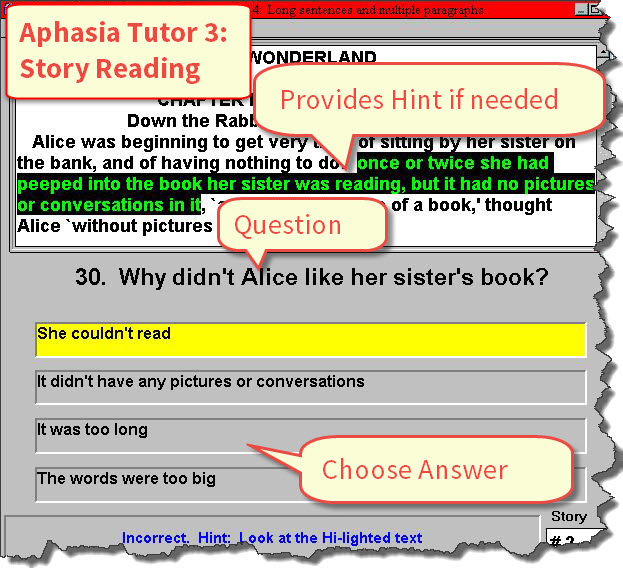Help survivors recover Reading Comprehension
Exercises for Reading Comprehension (Receptive Aphasia, etc.) impaired due to stroke or TBI.
I described in a previous issue (Speech & Language in Plain-English) that most people don't think about how language works, because there is no need. But, having a rough understanding of language, and the severity of deficits can help tremendously with recovery. That article provided a layman's guide to Speech & Language. This article covers Reading Comprehension. I'll cover the other 3 skills (Listening, Writing, & Speaking) in upcoming articles. This article should not replace a diagnosis from a speech therapist or other medical professional. It's meant to give a layperson a better (not perfect) understanding of speech & language to assist with caregiving and home therapy.
Reading comprehension means their ability to
understand what they
read.
It does not
mean reading aloud.
How Reading Comprehension can be impaired
There are other ways that Reading ability can be impaired, but I'm covering just the basic ones.
- Difficulty with vision. They can’t see the letters.
- Difficulty recognizing or decoding a single word.
- Left or Right neglect causing
them to not notice the right or left side. This can prevent them from
reading from one line to the next because they do not notice the end
(right) or beginning (left) of the line. I have a few
suggestions below for Left/Right Neglect.
This can seem like a vision problem but it’s actually more cognitive. If, for example, they have left neglect, often it will cause them neglect (not notice) things to their left that they hear, see, or touch. - Difficulty processing longer passages, perhaps due to just being overloaded with too many words which can cause them to lose mental focus.
Evaluating Reading Levels
Evaluate only their Reading. Give them something to read and let them match it to something else.
It's OK if they do it slowly.
Reading can be done at the survivors' own speed. So I tend to focus
primarily on what level they can read it (not the speed of reading).
- Letter (A, b, c. )
Give them two lists of letters. Uper and Lower case.
Match upper to lower. Obviously, choose pairs that don't look like each other: C:c, I:i better test: A:a, B:b, E:e, G, g etc., - Word ( Apple, Banana, Chair)
Give them a list of words and pictures. Match the word to the picture. You can use the worksheets below or use Google Image search to find appropriate pictures. - Sentence (I am eating a red
apple)
Same method as Word, but the text will be a complete sentence. - Paragraph
Give them a paragraph, a question, and several answers to choose from - Multi-Paragraph
Same as #4, but multi paragraphs to read.
There can be other factors to a Reading deficit, such as difficulty remembering what they read a few minutes ago.
Worksheets for Reading Comprehension
Click the links to the worksheets below (in PDF format) and print them for home practice.
- Letter Matching
- Picture-Word Matching (this can also be used for auditory comprehension if you cover the words)
- Yes-No Questions (about the survivor)
- Reading: Paragraph Comprehension #1
- Reading: Paragraph Comprehension #2
Independent Reading Practice at Home
You can also use speech therapy software for Reading Comprehension. I work on two different sets of programs for this:
For lower level reading (letters, words, and sentences) you can try our web app, MoreSpeech.com, which works on all modern devices via the internet. (Screenshot, right, lists some of it's Tasks)If you have a Windows PC and you need practice at the paragraph level or higher (or your internet access is not high speed), try our Windows PC programs:
For the Windows PC
- Aphasia Tutor 1: Words
- Aphasia Tutor 2: Sentences
- Aphasia Tutor 3: Stories
- Aphasia Tutor 4: Functional Reading
All 4 of the above (and another 16 programs) are included in the Bungalow PC Subscription.
Tips for Left/Right Neglect
This is a fascinating deficit. It's not a visual problem, it's more cognitive. It affects awareness of what's on the left or right in terms of what you see, hear, and feel. It's like that sides doesn't exist. I'm sure it's not fascinating to people who have it!
What makes it difficult is that the survivor does not realize they are not seeing something, so they don't know they need to compensate. So, the treatment involves teaching them to be aware of the deficit.
It can affect reading by making it hard to track from one line to the next. If you can't read the last word of the current line (or the first word of the next line) you can't easily figure out what line is next.
There are two things you can do to help:
- Use a bookmark under each line and move it down for them when it's time for the next line.
- Put a colorful bookmark on the side they are neglecting (left or right) and tell them to read until they see the color. They may think they have read to the end, but if they don't see red yet, then they haven't scanned to the edge of the page. You can see what this looks like in the screenshot of RedBar to the right.
-
Our program RedBar works on that skill on the computer. It puts a red bar up on the left or right side of the screen and periodically asks them to click it. So we training them to find that edge (which they'd normally ignore). You can use RedBar with any other program to read on the screen. For example, they can read an article in their web browser, or use one of the reading programs for the PC above. So, as they read, they will be reminded "hey, look all the way to the side" regularly, making it easier to see the entire line.

The survivor looks right...right...right
...until they see the Red Bar. - Aphasia Tutor 3, mentioned above, has a built-in reading cursor that highlights one word at a time, guiding the patient's vision (and attention) to each word.
Let me know how you liked this article (good or bad!) by commenting at the bottom of the page.
Coming up in the next issues:
Understanding and helping with
- Auditory Comprehension
- Writing (spelling)
- Speaking
Every day is an opportunity for recovery. Don't miss a single day.
- Surprising neuroscience discovery that makes recovery possible at any age.
- Why embracing failure leads to faster recovery.
- Unlock your survivor's communication needs in 4 steps.
- How to improve speech & language at the kitchen table.
Clay Nichols
Co-founder of
MoreSpeech and
Bungalow Software
for unlimited speech therapy at home and in the clinic.
 For
3 decades, Clay has helped patients, caregivers and speech pathologists
with speech & language software. He is not a speech-language
pathologist.
For
3 decades, Clay has helped patients, caregivers and speech pathologists
with speech & language software. He is not a speech-language
pathologist.
© 2025 Bungalow Software


